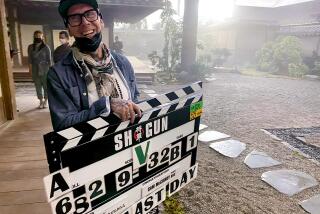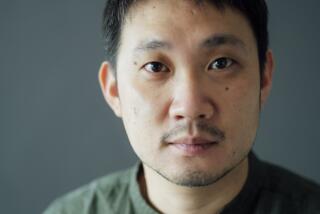Morality Plays the Lead Role
- Share via
One of the most affecting images in Akira Kurosawa’s “Rashomon” is of the characters hurtling through the forest, as if they’re rushing to an unholy shrine.
They always end up in the same spot, a dense glade where a rape and murder take place. It’s the central event of the 1950 movie, which screens Friday as the first installment in UC Irvine’s “Tragedy and Comedy” series, and Kurosawa keeps bringing them and us back to it.
We soon learn that the crimes may be dramatic, but they aren’t as profound as everybody’s interpretation of them. Kurosawa isn’t nearly as interested in the acts as he is in what they say about man’s weakness.
By using flashbacks to retell the rape and murder in differing ways, the Japanese director explores the reach of man’s frailty in finding personal morality.
He said as much in “Something of an Autobiography,” his 1982 reflection on his extraordinary career. Kurosawa wrote that he wanted to probe “the depths of the human heart as if with a surgeon’s scalpel, laying bare its dark complexities and bizarre twists.”
By all accounts, his cuts went deep.
Although “Rashomon” wasn’t hailed by Japanese critics, it became important in other countries, including here.
The film is credited with opening an international door to the expanding Japanese cinema and, particularly, for creating art-house fervor for Kurosawa in America.
The picture begins with three strangers (played by Takashi Shimura, Kichijiro Veda and Minoru Chiaki) finding shelter in the ruins of the Rashomon Gate at the entrance of Kyoto in the 11th Century.
As the rain comes down, they discuss the killing of a samurai lord (Masayuki Mori) and the attack on his wife (Machiko Kyo) by a bandit (Toshiro Mifune).
The talk is animated and disturbed because they find the crime so difficult to fathom; the barbarity of it shocks two of the men while the third attributes it to the world’s harshness. From there, Kurosawa takes us back to the first of the interpretations, using the bandit’s point of view.
Now in custody, he confesses, giving the basic facts. He noticed the nobleman and his wife, then decided to rape her, even if it meant murdering the man. He recounts the events with passion, giving them a heroic shading as he describes the battle between the two men that preceded the killing. Further, it was the woman, he said, who insisted they fight to the death.
Then the woman tells her side. Next, the dead lord gets to tell his (Kurosawa tosses in a medium who channels his spirit for these bold sequences). Then one of the strangers, who claims to have witnessed the crime, tells his version.
All the perspectives are self-serving, or at least shaded by personal biases. Kurosawa is offering a dark sermon--life is violent and tragic, and we’re not even strong enough to deal with it honestly.
The movie’s sentimental coda, where two of the strangers have a gentle epiphany over an abandoned baby, doesn’t do much to diminish Kurosawa’s pessimism.
What keeps “Rashomon” from becoming didactic are Kurosawa’s vibrant visuals, which show his trademark grace with action sequences that somehow carry both verve and naturalism in each frame.
The film is not only about thought, but movement, as each story is played out with small variations.
* What: Akira Kurosawa’s “Rashomon.”
* When: Friday, Jan. 14, at 7 and 9 p.m.
* Where: The UC Irvine Student Center’s Crystal Cove Auditorium.
* Whereabouts: Take the San Diego (405) Freeway to Jamboree Road and head south to Campus Drive and take a left. Turn right on Bridge Road and head into the campus.
* Wherewithal: $2 to $4.
* Where to call: (714) 856-6359.
MORE SPECIAL SCREENINGS
The Trouble With Angels
(NR) Hayley Mills and company wreak havoc as students of a convent school, with mother superior Rosalind Russell striving to maintain order, in director Ida Lupino’s 1966 comedy. It will screen Friday, Jan. 14, at 12:45 p.m. at the Cypress Senior Center, 9031 Grindlay St., Cypress. Public welcome. (714) 229-6776. FREE
Shenandoah
(NR) Jimmy Stewart stars as a Virginia widower whose apathy is tested when his family becomes engulfed in the Civil War in director Andrew V. McLagen’s 1965 drama. It will screen Wednesday, Jan. 19, and again on Jan. 21 at 12:45 p.m. at Cypress Senior, 9031 Grindlay St., Cypress. Public welcome. (714) 229-6776. FREE
Chan Is Missing
(NR) Wood Moy and Marc Hayashi are two Chinatown cabdrivers tracking down Chan, who stole their $4,000, in director Wayne Wang’s independent 1982 comedy. It will screen Jan. 21 at 7 and 9 p.m. in the Student Center Crystal Cove Auditorium at UC Irvine, Campus Drive and Bridge Road, Irvine, as part of the UCI Film Society’s “Tragedy and Comedy” winter series. $4. (714) 856-6379.
More to Read
Only good movies
Get the Indie Focus newsletter, Mark Olsen's weekly guide to the world of cinema.
You may occasionally receive promotional content from the Los Angeles Times.










